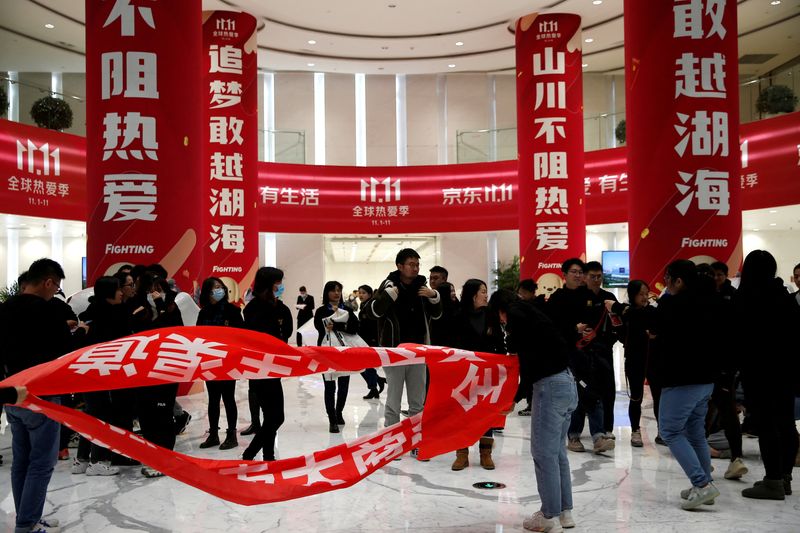By Casey Hall and Sophie Yu
SHANGHAI (Reuters) - China's largest shopping event is underway but most merchants and retail analysts expect flat or at best, tepid sales growth, noting consumers are still very much dispirited by the country's economic woes.
The Singles Day shopping extravaganza, which began last week, has morphed from an Alibaba (NYSE:BABA) event aimed at persuading single people to pamper themselves to a weeks-long festival that peaks on Nov. 11 across all of China's major e-commerce platforms as well as in bricks-and-mortar stores.
Furniture vendor Wu Qian, said he registered on JD (NASDAQ:JD).com this year because it was an opportunity to clear inventory and perhaps eke out a small profit. But he is not expecting the event to show overall sales growth.
"Consumers no longer wait for shopping festivals to shop," he said, adding that diversification in China's e-commerce platforms meant they had an array of choices all year round.
A property sector in crisis, trade tensions and regulatory crackdowns on a number of industries have all played a part in sputtering growth for the world's second-largest economy over recent years, resulting in job insecurity for many Chinese.
Beijing outlined stimulus measures in late September to prop up the world's second-largest economy but many have yet to be detailed, let alone impact consumer confidence in a significant way.
Last year, cumulative gross merchandising volume (GMV) sales across major e-commerce platforms rose 2% to 1.14 trillion yuan ($156 billion), according to an estimate from data provider Syntun. That's a far cry from the double-digit growth that was once the norm.
"It’s all pretty quiet now," said Lu Zhengwang, an independent e-commerce expert. "Vendors are becoming more rational, GMV is not the core pursuit, profit is. However, profit is hard to reach, the competition is still super intense, and only cheaper-price sells."
Heavy discounting has been a hallmark of e-commerce in China for the best part of two years as Alibaba and JD.com fend off competition from low priced rivals such as PDD-owned Pinduoduo (NASDAQ:PDD), squeezing the profits of thousands of small businesses.
This Singles' Day, there have been signs that the pressure has eased with Alibaba's domestic e-commerce arm announcing a raft of merchant friendly policies. JD.com and PDD have also flagged merchant support initiatives.
"I think platforms now understand that putting pressure on brands to lower prices means they don't have the money to pay for their ads," said Jacob Cooke, CEO of e-commerce consultancy WPIC Marketing + Technologies.

Zheng Li, 46, says she used to take Singles Day very seriously, snatching up deals on clothes and everyday goods but no longer.
"This year, I really can't find any inspiration," she said. "Maybe I'll buy a down jacket for my son."